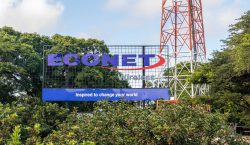


Diaspora Infrastructure Development Group chairman Donovan Chimhandamba
Government last year signed a $400 million deal with the Diaspora Infrastructure Development Group (DIDG) and South Africa’s Transnet to resuscitate NRZ, but the transanction has dragged on for the past 18 months due to certain conflicted senior government officials and advisors.
A senior government official close the transaction said the DIDG deal was the closest that NRZ has ever been to recapitalisation.
“The official statement by…Mnangagwa is a huge step forward and bureaucrats should now swiftly move from negotiating and analysis and start implementing the project with DIDG,” said the official.
In his state of the nation address on Tuesday, Mnangagwa said he was happy with the US$420 million raised by DIDG – through the Afreximbank and other regional banks – aimed at resuscitating NRZ.
Financing term sheets seen by The Financial Gazette show that Afreximbank will be the Manadated Lead Arranger who will underwrite $100m and syndicate other financial institutions the balance of the money required. Banks that have provided termsheets which Afreximbank may look to arrange from include Standard Bank which is ready to inject $317 million, Absa (US$200 million), Nedbank (US$200 million) and the Industrial Development Corporation of South Africa (US$100 million).
However, despite the proof of funding and approval by the Martin Dinha-led NRZ board, Transport minister Joel Biggie Matiza and other bureaucrats with personal interests are said to be scuttling the deal. Matiza did not respond to questions sent to him.
This has bred fears that unless Mnangagwa and his office keep close tabs on the deal, which involves acquiring rolling stock, signalling equipment and information communication technology equipment, its implementation could suffer a still birth like previous attempts.
There have been several attempts to attract investment to recapitalise the NRZ in the last 15 years, and all the previous efforts failed at various stages before conclusion mainly due to government’s bureaucracy and indecision.
For instance, the African Development Bank in 2003 tabled its proposal to revive NRZ, while the Development Bank of Southern Africa and Transnet also made attempts in 2012 also hit a snag due to government red-tape and conflicting corrupt interests from government officials.
The Chinese also offered to revive the parastatal in 2017 at an estimated cost US$7 billion, but the bid was rejected as it was unsustainable.
Local think-tank Econometer Global Capital (Econometer) last week warned that continued delays in implementing the deal could jeopardize revival of the parastatal.
“The NRZ deal reminds many of the resuscitation of Ziscosteel,” Econometer said.
“There was pomp and fanfare when Indian investors were announced as new investors for the yesteryear steel giant. The deal collapsed due to disputes over concessions and bureaucratic red tape. The chances of reviving Ziscosteel are almost remote.”
Indian firm Essar Africa Holdings in 2011 promised to inject $750 million into Ziscosteel, but the deal collapsed in 2016 leading to Essar’s unceremonious exited.
Essar had undertaken to take over Ziscosteel’s debts, invest in new iron ore fields in Chivhu and pay off its 3 000 workers’ salaries.
But conflict in the then inclusive government led by President Robert Mugabe’s ZANU-PF and the late Prime Minister Morgan Tsvangirai’s Movement for Democratic Change between 2009 and 2013 precipitated collapse of the Essar deal, whose departure even surprised government as it appears to have been abrupt.
Econometer said the fact that reputable Zimbabwe Stock Exchange listed firms are struggling to raise funding pointed to the roadblocks that awaited investors like DIDG in its efforts to find capital for NRZ.
NRZ’s performance has been affected by a slump in freight due to extensive de-industrialisation in Zimbabwe, as well as foreign currency shortages that have affected its efforts to import spares. There has been a shortage of locomotives and wagons, while extensive damage to railway tracks has precipitated accidents.